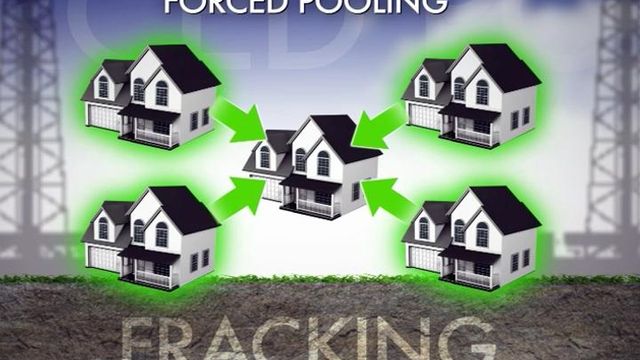Panel examines forcing landowners to allow gas drilling
A study group of the North Carolina panel developing regulations for natural gas drilling on Friday discussed the controversial practice of forcing landowners to have gas pumped from under their property.
Posted — Updated"Forced pooling" joins leased and unleased tracts of land so there is sufficient acreage to form a drilling unit for natural gas extraction.
Proponents say it protects property owners by requiring gas companies to pay royalties to anyone who hasn't sold their mineral rights, but opponents argue that the practice violates individual property rights.
"It's like the homeowners association from hell," said Therese Vick, a community organizer with the Blue Ridge Environmental Defense League. "If you look at the issue and you look at people's well-being, their quality of life, there's just no way to make this law right."
Lee County landowner Ed Harris calls forced pooling a declaration of war on property rights.
"These people are trying to run roughshod over the people of North Carolina and not give us a fighting chance," Harris said of the state Mining and Energy Commission, which is drafting gas drilling regulations.
"My land belongs to me. It does not belong to Jim Womack, Ray Covington and (other members of) the Mining and Energy Commission. It belongs to me," he said.
The study group is trying to determine how many landowners would have to agree to drilling before one of their neighbors is forced into the pool and what a reasonable royalty for those people would be.
The group also learned about pooling laws in other states and the life cycle of a mineral rights lease. About 40 states allow some type of forced pooling, but details vary from state to state.
North Carolina has had a forced pooling law for decades, but it's never been enforced. Womack, the commission chairman, said it doesn't adequately address the horizontal drilling used in hydraulic fracturing.
The process, also known as "fracking," involves pumping a high-pressure mix of chemicals, water and sand into a well to break apart shale deposits and release the natural gas trapped in the rock.
"What we have to do now is to tighten up that law so that there are not as many gray areas and so that the facts are well known and the people are well informed," Womack said.
The Mining and Energy Commission is to report its findings, recommendations and proposals to the legislature by Oct. 1.
Gov. Pat McCrory has said he'd like to see drilling start in North Carolina as soon as possible once lawmakers approve regulations for it.
• Credits
Copyright 2024 by WRAL.com and the Associated Press. All rights reserved. This material may not be published, broadcast, rewritten or redistributed.






